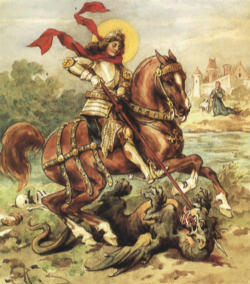America
loves heroes. I mean, it's in human nature to love a hero because, as Neil
Gaiman put it, they "don't show us dragons exist, they show us dragons can
be beaten."
In
other words, heroes are proof that we can overcome the hardships life throws
our way. Their stories show us we are more than our littleness and weakness. We
can be strong.
But
America is especially obsessed with them. Half the movies coming out nowadays
are superhero blockbusters or remakes of favorite heroes of old.
However,
I’ve been noticing a growing trend in the way modern heroes are portrayed.
There's
a line from this summer's "The Lone Ranger" that, I think, sums it
up: "There comes a time, Kimosabe, when good man must wear
mask."
Reminiscent
of the story of Robin Hood, the hero of the film, The Lone Ranger, is forced to
become a bandit because men, who were supposed to be good, such as sheriffs,
were evil.
Good
had to be disguised because the society he lived in no longer recognized good.
The
fact that movies like this one are being produced speaks volumes about our
culture.
See,
our culture has a fascination with anti-heroes, or villians. In disastrous
events like Sandy Hook, Aurora Colorado or the Boston Marathon Bombings, our
focus is on the killers and why they would commit something so horrible. We hardly
glance at the victims, or the emergency response teams that show up to save the
day. We're more fascinated by what lunatic is on the loose now.
G.K.
Chesterton said, "The old fairy tale makes the hero a normal human boy;
it is his adventures that are startling; they startle him because he is normal.
But in the modern psychological novel the hero is abnormal; the center is not
central. Hence the fiercest adventures fail to affect him adequately, and the
book is monotonous. You can make a story out of a hero among dragons; but not
out of a dragon among dragons. The fairy tale discusses what a sane man will do
in a mad world. The sober realistic novel of today discusses what an essential
lunatic will do in a dull world.”
Chesterton's
onto something. My whole life, I've wondered why, generally, the stories produced
during my lifetime were so forgettable; sure, they were fun initially, but that
was it. And on the other hand, old stories like The Lord of the Rings or The
Chronicles of Narnia, or older stories of King Arthur and Robin Hood, were so
memorable.
It's
because now, as a culture, our focus has shifted to the villain; we don't glorify
virtue anymore. What was once taboo is celebrated and traditional virtue is
mocked and called “outdated”. We went from portraying the normal, every day
hero beating the dragons. Now, we focus on the dragon among dragons.
“The
Lone Ranger” was a dud because the hero wasn't actually a hero. (Also the plot
was boring.) He didn't sacrifice himself in any way, he didn’t have any
"save the day" moments or stunts. He was almost a sidekick to Johnny
Depp's anti-hero, Tonto. Tonto wasn't a hero at all, he was incredibly selfish,
but he was still the focus of the film.
Even
in many superhero movies, there is a growing trend in the "hero"
being the guy that's really messed up. Take Robert Downey Jr.'s Ironman, for
example. I'll admit, he's as entertaining as heck, but is he a real hero? I
don't think so.
And
maybe we like that because we can relate to it, or we're entertained by it.
But it doesn't give us anything to look up to. The stories that stay with us
are transcendent; they remind us who we were made to be. We were made for more.
We were made for greatness. We were made to rise above ourselves, not to be
complacent in our weakness.
I’m
not saying that movies like this are wrong to watch; still, it’s good to pay
attention to what we’re subliminally being fed in media. They tell us what is
worthy of being admired, and if we pay to enjoy that media, we send a message
back to the producers that this is the kind of media we want to see.
I’ll
pay for the media that praises real virtue and gives me something to hope for, even if the culture I live in no longer recognizes the good.


